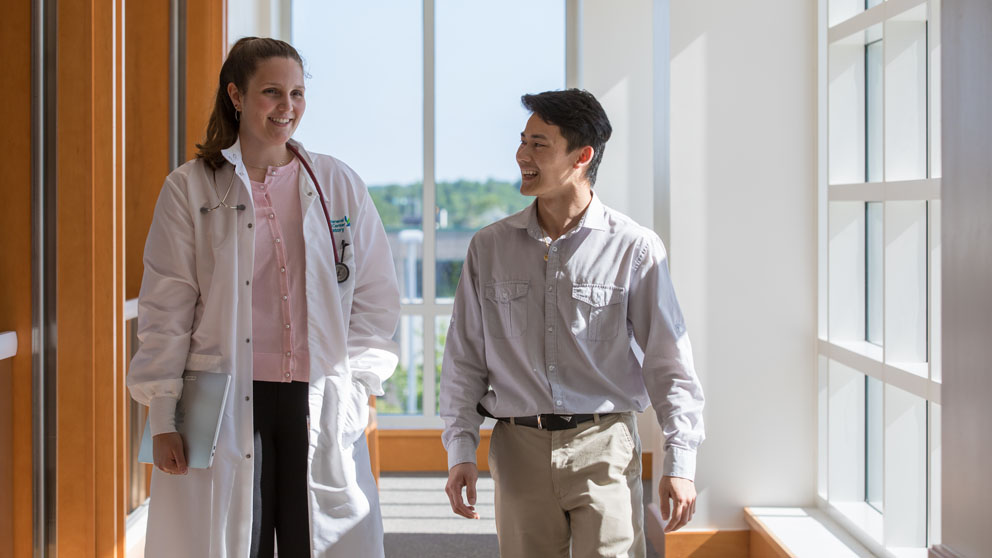
Oncology practices in Maine will continue to have access to advanced educational curricula on genomic tumor testing in patient care through the Maine Cancer Genomics Initiative (MCGI), thanks to a gift from the Maine Cancer Foundation.
The Jackson Laboratory (JAX), a nonprofit biomedical research institution headquartered in Bar Harbor, Maine, designed the initiative to provide access to the latest advances in precision cancer care to the state’s cancer patients, many of whom are treated at small community hospitals. Founded in 2016 with a grant from the Harold Alfond Foundation, the first-of-its-kind community genomic medicine program in Maine has enrolled every oncology practice in the state, and more than 90% of its oncologists.
And now the Maine Cancer Genomics Initiative has received $199,891 from Maine Cancer Foundation to expand its innovative educational curriculum to support community oncology clinicians in the use of genomics in patient care.
“We are grateful to Maine Cancer Foundation for their generosity, and proud to be able to continue offering this unprecedented level of genomic education to clinicians in our state with their support,” says Jens Rueter, M.D., medical director of MCGI. “Ultimately, cancer patients in Maine will benefit from this educational program, which will give oncologists the tools to appropriately use genomic information in their practices and to communicate this important information to patients and families.”
“In an effort to reduce the impact of cancer in Maine, we launched our Challenge Cancer 2020 initiative,” says Aysha Sheikh, Director of Programming at the Foundation, whose mission is to reduce cancer incidence and mortality in Maine. “The Maine Cancer Genomics Initiative’s educational efforts will empower oncology providers across the state to determine the best treatment avenues for Maine cancer patients.”
A CRUCIAL NEED
Genomics is helping transform cancer care by providing a greater understanding of how cancer develops and grows, and by enabling the development of treatments that target the specific genomic changes driving cancer in an individual patient. For patients to benefit from these advances, clinicians must have the knowledge and confidence to use genomic tumor tests and interpret their findings.
The good news is that with rapidly advancing DNA sequencing and bioinformatics technology, using genomic testing for cancer risk prediction, diagnosis, and treatment is increasingly accessible. But while evidence supporting its clinical application is growing, guidelines have not kept pace with the technology, and clinicians are left facing challenging decisions about which patients should be offered testing and how to interpret results for patient management.
The impact of this challenge is significant: if cancer patients are not offered genomic testing, or if their physicians do not accurately interpret testing results, patients may not know that they are eligible for novel targeted, and possibly effective, therapies.
“The Jackson Laboratory views the Maine oncologists not only as recipients of the education developed by the MCGI, but also as active participants in the creation of these materials by providing continuous feedback which will be used to develop the next iterations of genomic education,” says Andrey Antov, Program Director of the Maine Cancer Genomics Initiative.
A GENOMIC EDUCATION COMMUNITY FOR MAINE
With the initiative’s expanded curriculum, developed by JAX’s clinical education team, cancer care teams across Maine will have access to educational resources focused on key clinical decisions, including identifying appropriate patients for genomic testing, choosing the right test for the patient, facilitating informed decision-making, interpreting test results, and communicating next steps.
The new resources will be available in a variety of formats including webinars, online materials, and video, and will be housed in a searchable web repository so that clinicians and other members of cancer care teams have easy access to them
“This unique curriculum will build on and reinforce the clinical assessment skills needed to use and interpret genomic tumor testing,” says Kate Reed, Director of JAX Clinical Education Program. “The resources will augment other efforts, including case discussions with experts, to support increasing knowledge and confidence with this testing.”
Maine Cancer Foundation’s grant is offered as part of their ongoing Challenge Cancer 2020 initiative focused on reducing cancer incidence and mortality in Maine. The Foundation has awarded $9.5 million since 2015 in support of this initiative, focused on prevention, early detection and screening, and improving patient outcomes for Mainers. To learn more about Maine Cancer Foundation, visit www.mainecancer.org, or contact Katelyn Michaud, katelyn@mainecancer.org, 207.773.2533.